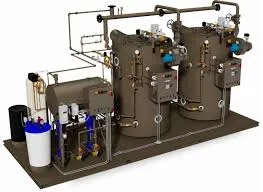
Dec . 24, 2024 08:53 Back to list
Exploring the Efficiency of Oil-Fired Steam Boilers for Industrial Applications
The Role of Oil in Steam Boilers Efficiency and Sustainability
Steam boilers have been fundamental to various industries, providing critical services such as power generation, heating, and process steam for manufacturing. Among the numerous fuel options available, oil has remained a popular choice due to its high energy density and convenient supply chain. This article explores the essential elements of using oil in steam boilers, focusing on efficiency, sustainability, and the future of oil as a fuel source.
Understanding Steam Boilers
Steam boilers operate on a simple principle water is heated to create steam, which can then be used to perform work, such as turning turbines or heating buildings. In an industrial context, steam boilers are often categorized into two types fire-tube and water-tube. Fire-tube boilers have hot gases passing through tubes surrounded by water, while water-tube boilers have water flowing through tubes heated by flue gases. Regardless of the type, one of the critical factors determining the efficiency and performance of steam boilers is the fuel used to generate heat.
Oil as a Fuel Source
Oil is widely used in steam boilers due to its excellent properties. It has a high calorific value, which means it can produce more energy compared to other fuels like natural gas or coal. This high energy density is crucial for industries that require a reliable and consistent steam supply. Moreover, oil can be stored easily and transported efficiently, making it a convenient option for many facilities.
However, using oil in steam boilers comes with its challenges. The combustion of oil can lead to higher emissions of pollutants such as nitrogen oxides (NOx) and sulfur oxides (SOx) compared to cleaner alternatives. Consequently, regulatory pressures are pushing many industries to consider alternative fuels or more efficient combustion technologies to reduce their environmental footprint.
Efficiency Considerations
steam boiler oil

Improving the efficiency of oil-fired steam boilers is a major concern for operators in various industries. One of the primary methods to enhance efficiency is through the use of advanced combustion technologies, such as low NOx burners, which minimize emissions while maintaining high efficiency. Additionally, regular maintenance is vital to ensure optimal performance. Periodic cleaning of the combustion chamber, checking fuel injectors, and ensuring proper insulation of steam distribution lines can significantly impact the efficiency and longevity of a steam boiler system.
Heat recovery systems can also enhance overall boiler efficiency by capturing waste heat from flue gases and using it to preheat feedwater or provide heat for other processes. This not only conserves energy but also reduces fuel consumption, leading to lower operational costs.
Sustainability Challenges
While oil remains a pivotal fuel source for steam boilers, the global shift towards sustainability and carbon neutrality places significant pressure on industries reliant on fossil fuels. The rising costs of oil, coupled with stringent environmental regulations, drive many companies to diversify their fuel sources. Alternatives include biomass, biofuels, and electricity from renewable sources, all of which promise lower emissions and greater sustainability.
Transitioning from oil to more sustainable options does not come without challenges. The infrastructure for new fuels, such as biofuels, may require significant investment in technology and training. Adaptation of existing steam boiler systems to accommodate alternative fuels is critical to ensure a smooth transition.
The Future of Oil in Steam Boilers
The future of oil as a fuel source for steam boilers will likely be shaped by technological advancements and regulatory frameworks promoting cleaner energy. Enhanced oil recovery techniques and improved combustion technologies may allow the industry to continue utilizing oil while minimizing its environmental impacts. Furthermore, the development of hybrid systems that incorporate renewable energy sources alongside traditional oil burning could provide a balanced approach to energy generation.
In conclusion, while oil has been a reliable fuel source for steam boilers, the evolving landscape of energy needs and environmental responsibility suggests that its role will change. Industries must innovate and adapt to ensure effective, efficient, and sustainable steam generation in the years to come.
-
High-Efficiency Commercial Oil Fired Steam Boiler for Industry
NewsJul.30,2025
-
High-Efficiency Biomass Fired Thermal Oil Boiler Solutions
NewsJul.30,2025
-
High Efficiency Gas Fired Thermal Oil Boiler for Industrial Heating
NewsJul.29,2025
-
High-Efficiency Gas Fired Hot Water Boiler for Sale – Reliable & Affordable
NewsJul.29,2025
-
High Efficiency Biomass Fired Hot Water Boiler for Industrial and Commercial Use
NewsJul.29,2025
-
High-Efficiency Biomass Fired Hot Water Boiler for Industrial Use
NewsJul.28,2025
Related PRODUCTS






















